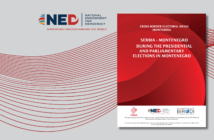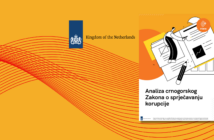Access Info Europe (AIE) has conducted an analysis of the Law on Free Access to Information in Montenegro, evaluating its alignment with the international standards that the country is bound to uphold, including the Council of Europe Convention on Access to Official Documents, General Comment Number 34 of the United National Human Rights Committee, rulings of the European Court of Human Rights, EU’s Regulation 1049/2001 and the jurisprudence of the Court of Justice of the European Union.
The Montenegrin Law on Free Access to Information is undermined by some serious limitations on the right to request information, limitations which have a particularly negative impact on the ability of civic actors to fulfil their role as public watchdogs, and hence limitations that run directly counter to international human rights standards and to the jurisprudence of the European Court of Human Rights.
A huge problem with the Montenegrin Law on Free Access to Information is the newly added Article 1, which contains a series of class exclusions which are out of line with and unacceptable under international standards, as well as going against the Constitution. In the first paragraph, Article 1 simply establishes that the right of access and reuse shall be under this Law. Then, very bizarrely, Article 1 contradicts itself by saying that certain information shall not fall under the scope of the law, and defers immediately to other norms.
Broad discretion given to public authorities to determine secrecy (Article 16) and the lack of a sufficiently broad public interest test (Article 17) are contrary to the practices well established by the Court of Justice of the European Union. According to the Court, a refusal for access must “explain how access to that document could specifically and actually undermine the interest protected by the exception” and such harm must be “reasonably foreseeable and not purely hypothetical”. The Court has further stressed that the “mere fact that a document concerns an interest protected by an exception is not of itself sufficient to justify application of that exception”.
The public interest test in Montenegro is much more limited than that is established by international standards and practice from the European Union and countries around Europe and globally.
Another concern in the 2017 version of the Law on Free Access to Information, is the introduction of exclusions related to business secrets and intellectual property. According to international standards, protection of commercial and business interests is a legitimate exception but it must be subject to the harm and public interest test. Finally, tracking the activities of public bodies and their relationships (financial and other) with private bodies is clearly in the public interest.
Also, intellectual property is not, per se, a ground for refusing access, even if it may limit use/reuse of certain information. Having in mind all above, we strongly recommend changes of the Law on Free Access to Information, in order to harmonize the Law with international standards.
Complete analysis download HERE (PDF)



